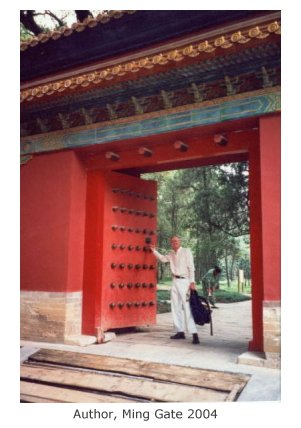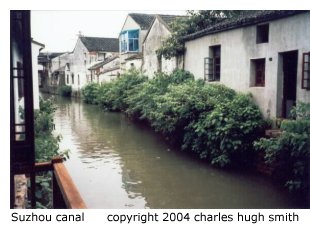

|
| weblog/wEssays archives | home | |
|
On-The-Ground Reporting in China (June 23, 2007) This Week's Theme: Context  Longtime correspondent Martin recently recommended an article on China
The Empire of Lies by French free-lance journalist Guy Sorman.
Longtime correspondent Martin recently recommended an article on China
The Empire of Lies by French free-lance journalist Guy Sorman.
What separates Sorman's report from the typical China story is his on-the-ground journalism with people and places rarely visited by Western media types. In case you didn't know, the Chinese government employs a vast army of people to manage/spin news, not just for its own citizens ("The Great Firewall of China" to censor the Web) but for the outside world as well. It takes some real digging to get past the bogus government statistics, cover-ups and lies. Sorman does a fine job, one which can't be denied or dismissed by cheerleaders. Here's a taste of his reporting: It had taken me several months and many intermediaries before I could finally meet with this self-effacing, frail 75-year-old, branded an enemy of China by the Party—a label it gives to anyone with the temerity to oppose the regime.Here is his report on the central government's response to AIDS: The government’s initial reaction was to deny any problem, isolate AIDS-affected areas, and let the sick die (a pattern that initially repeated itself when SARS broke out in the country).To extend our theme of Context with a Capital C, let's consider how little understanding of Chinese culture goes into the standard U.S. financial analysis. To take but one example, financial analyst John Mauldin is recommending a book by PIMCO (bond fund) manager Paul McCulley and veteran reporter Jonathon Fuerbringer, Your Financial Edge. From Mr. Mauldin's review, the book seems to have much good analysis of big issues; but the authors' lack of understanding of Chinese culture is striking. Here is a quote: "Ultimately, though, China will switch from a mass production economy to a mass production and mass consumption economy and have the courage and ability to free its exchange rate and shift away from its mercantilist model."I wonder if either of the writers actually knows any mainland Chinese people. Why do I wonder? Because every one of our many Chinese friends has paid off their house mortgage within a few years of its purchase. This is true regardless of which city they came from in China (central, coast, Nanjing, etc.) and regardless of their salaries: those with substantial incomes bought more expensive houses, and those with more modest salaries bought less expensive houses. How many non-Chinese Americans do you know who pay off their mortgage in 5 years? Again, these are not big-bucks doctors and lawyers or people who inherited wealth or trust funds; these are average folks with median incomes. Do you know how they achieved this monumental goal? Scrimp and save. Minimum consumption. No frills lifestyle. And once the mortgage is paid off, do they then begin spending lavishly? No, they buy another property or add on to their house--paid in cash. 
If you examine the lifestyles of everyone beyond the few million Shanghai-Beijing-yuppies, you will find a nation, and more importantly, a culture, of prodigious savers. If you know anything about Chinese culture or if you know even a few dozen mainland Chinese people well, you know China will not transition to a culture of consumption in this generation. A very good anthropological case could be made that China will never leap from a culture of savers and investors to one of borrowing and consumption. Not in five years, 20 years or even 100 years. Economies may change quickly, but cultures do not. Yes, Proctor and Gamble is selling Crest toothpaste to residents of small villages in western China. Chinese people will buy TVs, meat, seafood, and a variety of other consumer goods. But to claim that China's culture and economy will seamlessly transform from a mercantilist export-driven model to a consumerist clone of the U.S.--based on what evidence? A few million free-spending yuppies out of a nation of 1.2 billion? If you think that's a sound footing for an analysis of an enormous nation, then do you base your prognostications for the U.S. on the top-income residents of Manhattan? If so, your analysis will be fatally flawed. Yet financial writers continue to accept the most breathless extrapolations for Chinese consumption based on the spending of an equivalent handful of rich, top-of-the-heap free-spenders who can be seen in hotel bars and fancy restaurants in Shanghai and Beijing--the kind financial journalists apparently base their "research" on. If you haven't read my own attempt at providing a broad context for China's economy, here it is: China: An Interim Report. For more on this subject and a wide array of other topics, please visit my weblog. copyright © 2007 Charles Hugh Smith. All rights reserved in all media. I would be honored if you linked this wEssay to your site, or printed a copy for your own use. |
||
| weblog/wEssays | home |